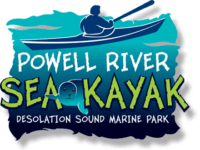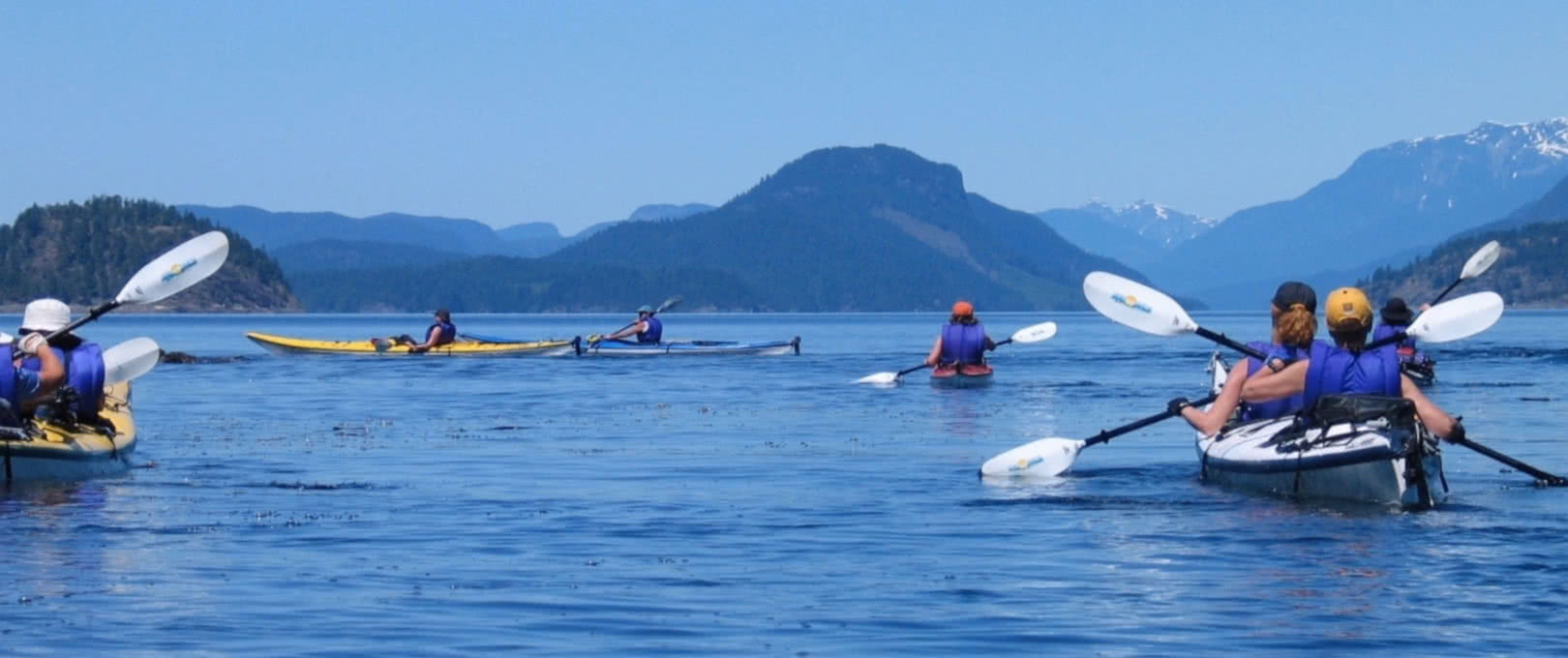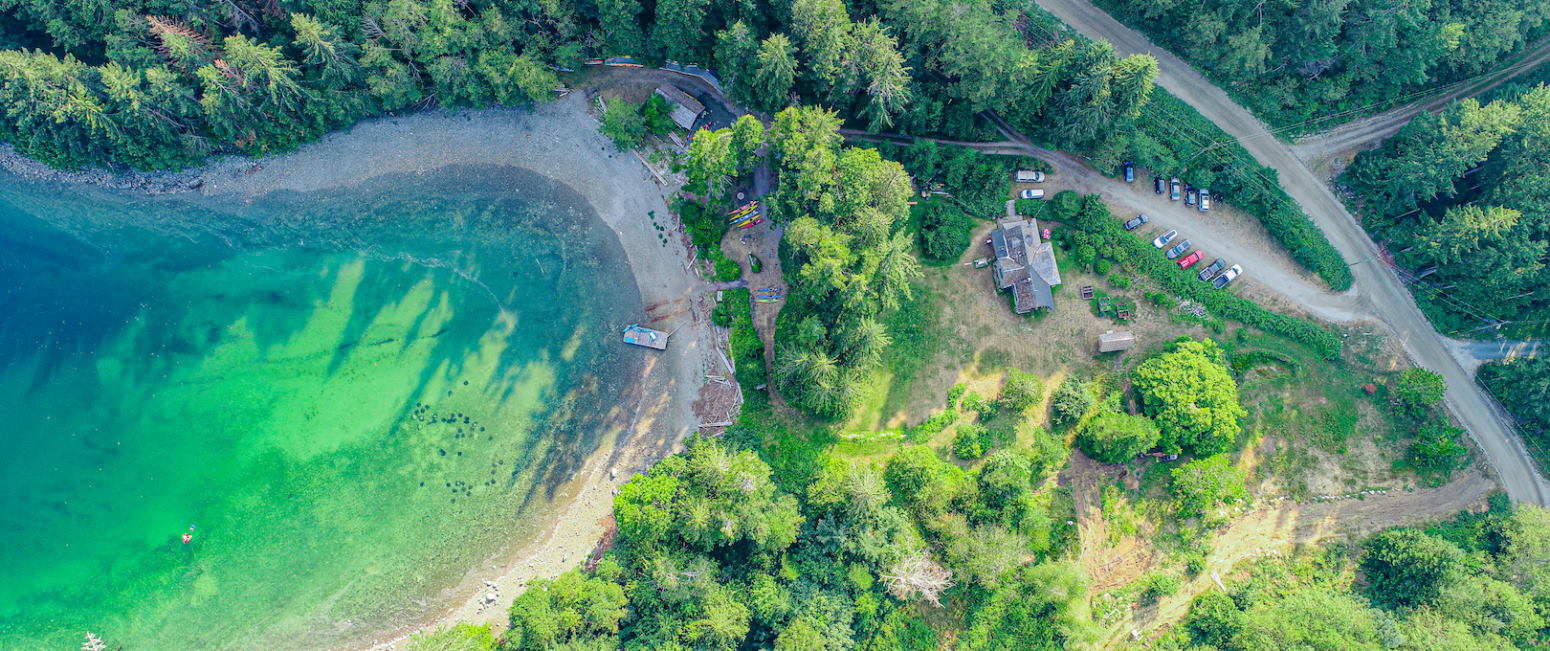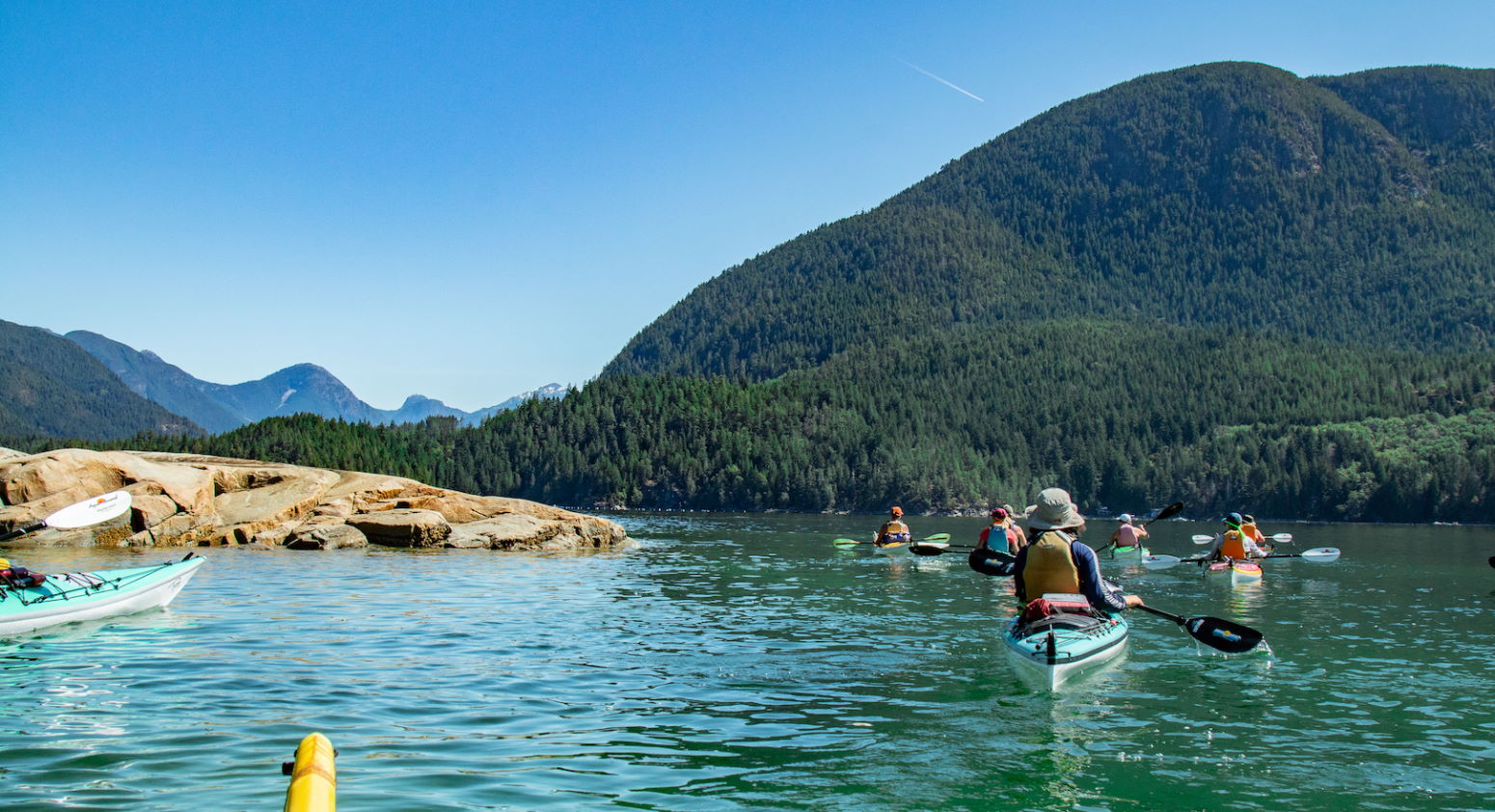Introducing Powell River Sea Kayak and Desolation Sound as your go-to destination for school and youth group outdoor programs. We offer an unbeatable location to access one of the premier sea kayaking destinations in British Columbia – Desolation Sound Marine Park.
With protected inlets and warm waters, convenient BC Parks campsites, and stunning mountain backdrops, Desolation Sound is the perfect remote-yet-accessible destination to learn new skills, create new bonds and friendships, and develop a deep appreciation of the beauty and fragility of our wild spaces.
Powell River Sea Kayak has created two options for school and youth groups: kayak & equipment rental without guides (you provide your own) or rentals plus certified guides to keep everyone safe and provide expert local knowledge to enhance your students’ experience and learning opportunities.
If you are a trip leader with a youth or school group and wish to use your own guides, please read our policies and considerations section at the end of this page before contacting us.
Our Location
Our base of operations and launch site into Desolation Sound is Penrose Bay in Okeover Inlet, 30 minutes drive north of Powell River at the top of the Sunshine Coast of British Columbia.
From both Vancouver and Victoria, we can be reached within six hours of travel by car or bus. Launching in the morning, key campsites in Desolation Marine Provincial Park can be reached between 2 and 5 hours of paddling. A remote adventure is waiting just a day from the city!
We have ample free parking for cars, vans and buses, as well as fresh water and waterfront access, meaning you don’t have to transport anything when you arrive. Our staff will have all the kayaks and equipment ready for your group on arrival, making the launch process as easy as possible for you and your group.
What is Included & What to Add-On
Our base rental package includes quality touring sea kayaks (doubles and singles available), all necessary kayaking equipment (paddles, spray skirts, paddle floats, pumps, throw bags, PFDs), and the convenient amenities of our waterfront location.
Available add-ons to the rental package include: dry bags, water dromedaries, paddling jackets, mask & snorkels, and snorkelling fins.
For school and youth groups we use an Informed Consent Document for parents and guardians versus typical legal waivers.
If you need a place to camp with your group on the day before or after your trip, the Okeover Arm Provincial Campground is conveniently just 3km away on the junction of Crowther and Malaspina Road.
Adding Guides
All school and youth groups must abide by our commercial client : guide ratios. Many groups will provide their own certified guides, but others may require one or more to be provided to ensure a safe and successful trip.
We have a team of Lead and Assistant Overnight Guides that are certified by the Sea Kayak Guides Alliance of British Columbia (or equivalent) and depending on availability and the existence of our commercial tours, may be able to provide one or more guides for your group (up to June 15th).
Professional guides not only provide a level of safety and instruction for novice paddlers, but locally trained guides can add a great deal of value to your key objectives for your group: in depth interpretation of the Desolation Sound area, knowledge of great routes and camps appropriate for the conditions, and a guaranteed level of professionalism and knowledge befitting a leading and experienced tour provider on the BC coast.
As a bonus, by providing guides your group will also gain the following advantages: commercial permits to operate in Desolation Sound (not including park fees), potential use of our private company campsite tenures, and the total cost of the package would only incur GST (and not PST).
All our guides also maintain current wilderness first aid certifications and are trained by us in our company safety protocols as per our risk management plan.
We typically have an understanding of our guide availability early in the new year. Contact us for availability of our guides for any group rentals before June 15th and we will see if we can help.
Policies & Considerations
Common Self-Guided Mistakes
With over 20 years experience in Desolation Sound, we’ve seen some very well run, professional group trips, and we’ve seen the opposite. Some of the more common mistakes that self-guided groups have made over the years include:
Damage to Kayaks and Equipment
Extra care needs to be taken when leading a large group to ensure that the rental gear being used is not damaged or lost during the trip. It’s surprisingly easy to leave unused throw ropes, paddle floats, spare paddles, even PFDs back in camp during the general disarray of cleaning a site and getting on the water each morning. A disciplined approach to packing up and the use of equipment is crucial to avoid this.
By far the most common and costly oversight however is damage to the hull of the fibreglass kayaks that often occurs on these trips. Running kayaks up on the shore when landing, dragging kayaks over rough terrain instead of carrying them 2 or more people at a time, dropping loaded kayaks when trying to step over a log … all these and more lead to long, deep scratches and scrapes on the hull of the kayaks which inevitably lead to gel coat or even fibreglass repair, taking the kayaks out of the fleet for days or weeks at a time.
Trip leaders needs to be aware of the potential for this damage and have systems in place to ensure that this doesn’t occur. PRSK does charge damage fees for kayaks that return after a trip with clear damage caused by negligent or reckless activity.
Disrespect for the Environment
Surprisingly common amongst group trips is a negligent attitude to the fragility of the natural environment. While it’s probably unfair to claim that any group leaders are deliberately ignorant or disrespectful of the land, over the years we have seen campsites being made by clearing plants and undergrowth when perfectly acceptable established sites exist nearby, animals (sea stars, crustaceans, etc) being taken out of their natural habitat as keepsakes, trees felled to make room for cliff jumping, and even the sad tale of a neglected camp fire setting fire to a popular camp site in the provincial park after the group had left to paddle for the day.
As trip leaders it is your responsibility to impart this respect for the environment on the people in your care, and great pains need to be made to leave the land as it was before you arrived, to ‘leave no trace’ of your passage, and not to negatively impact the flora and fauna that you encounter on your travels. If you are not familiar with the ethics and principles of wilderness camping and travel, there are many books and publications available and we highly recommend you educate yourself of these principles before you arrive.
Lack of Leadership / Preparedness
Often linked to the issues above, it is important that trip leaders understand the gravity of their position and responsibilities before they agree to take young people out on the water. A lack of leadership or preparedness is often the root of all other problems, and can lead to poor morale, uncomfortable conditions, and in extreme cases injury, illness or death.
Do you have a route planned ahead of time? Are you able to make decisions in the heat of the moment to amend this route based on weather, group dynamic, group ability, or anything else? Do you have the right gear for all conditions? Enough food for the group? Do you know where the nearest water sources are? Do you have a way to sterilize this water if you find it? How are you going to dispose of waste?
All these questions and many more have to be asked and answered before a trip commences.
Below we list some considerations particular to sea kayaking in Desolation Sound that it is important you answer, but general preparedness and leadership – including discipline and systems – need to be considered as well, especially in remote, wilderness environments.
Things to Consider
Routes and Campsites
There are a number of camps in Desolation Sound – both within the provincial park and on crown land – but in the busy summer months these can fill up very quickly. A trip leader needs to have a route and camping plan set out before they leave, but they also need to have backup plans in case these camps are full, or in case the wind picks up from a certain direction, or in case a member or more of the group is not a strong paddler and can’t make the distance, or any number of things that may force a plan to change suddenly.
Please ensure that you have researched the area and the campsites throughly before you arrive – while our staff can often provide handy hints or tips, it is not their job to plan your trip out for you on the morning of the adventure. Also note that within Desolation Sound Marine Provincial Park there are designated camp sites that are monitored in the summer by Parks employees. You cannot simply camp wherever you feel, and if a site is full, you will have to paddle to the next one to find a place to stay. Even outside the park many of the crown land sites are not suitable for large groups – it is for this reason that we have had issues in the past with groups clearing land to make more sites, despite the fact a larger, unused camp lies nearby. Prior research is vital.
Reading Weather, Tides and Currents
Weather on the west coast in unpredictable, even in the generally warm and dry summer months, and can change quickly and seemingly without warning. A trip leader needs to have the means to read the weather both by constantly checking updates (VHF radio, smart phone, etc) and also by reading the environmental cues around them. This can include noticing cloud buildup and formations, wind direction and what this indicates, understanding anabatic and katabatic winds, and more.
When leading a trip with youth, this becomes doubly important. If the wind is building and you start a 30 minute crossing, are you going to be able to keep 6 double kayaks with tiring paddlers together? In a sense its not just the ability to read weather, but the ability to make decisions based on this that keeps people safe and comfortable on the water, and in camp.
While there are not huge ocean currents in Desolation Sound, there are a few areas that can run at 2.5-3 knots depending on the tidal activity of the day. Are you able to a) plan around these times, or b) successfully see a young group through an area with currents like this by travelling in eddies and using physical landmarks to your advantage?
Finally, can you read a tide table and put the information into practice? Great campsites can become flooded during king tides, and untied boats can easily slip away unnoticed on a rising tide in the middle of the night. Often young guests will leave their personal effects below the high tide line without thinking that in an hour or two they will be underwater or floating away!
Food and Water
Sometimes young kids eat a lot, especially when they’re active. A comprehensive meal plan is crucial when leading overnight trips into the wilderness. Not only this, but a balanced diet that provides enough energy for the activity is very important.
Water is scarce in Desolation Sound, and so you need to ensure you are taking as much as you can, that you know places to fill up and plan your route accordingly, and also that you have to ability to treat any water that you source from streams or lakes in the wilderness.
Leader to Child Ratio
Larger groups require more trip leaders, and groups that have a high ratio of children to leaders are difficult to manage both on and off the water. Weather plays a big part in this as well, and should be taken into consideration. It might be fairly easy to manage 4 double kayaks yourself in perfect conditions, but as soon as the wind picks up a little and you need to make a crossing to your campsite, suddenly it is impossible to keep everyone together.
We insist that all youth group trips abide by the client-guide ratio set out by the Sea Kayak Guide’s Alliance of British Columbia. This ratio is 1 certified guide for every 5 guests – or 1 to 6 for trips only using double kayaks.
This should be the minimum that a school or youth group should use when kayaking overnight in Desolation Sound. When you take into account potential weather issues and the fact that young people tend to tire much quicker than adults, it may be wise to work with a smaller ratio.
Double versus Single Kayaks
Linked to the above consideration, the common approach by youth groups looking to minimize risk is to take a majority of double kayaks. Doubles are more stable and easier to control in windier weather, and for trip leaders minimises the sheer numbers of boats they need to look out for. Doubles are also helpful if some members of the group are tired or weaker paddlers, and pairing them up with a stronger paddler can keep both the fast and the slow paddler paddling together at a middling speed.
Leadership Experience
At a minimum, trip leaders should have the same certifications as one of our regular guided trips and adhere to the guide to client ratios set by the SKGABC, or a similar training outfit in your country of origin (i.e. one certified lead guide and one certified assistant guide for a group of 10). These courses teach technical skills as well as all important self- and assisted-rescue techniques, towing, weather interpretation, tides and currents, navigation, and more, which is all essential knowledge for trip leaders on the west coast.
Leaders should also possess current (preferably wilderness) first aid and CPR certificates. If you are taking a VHF radio, it is important you know how to use it to check weather and make distress calls – and in fact it is actually illegal in BC to use a maritime VHF radio without taking a course in its use and functions!
All these above requirements will need to be indicated to management of Powell River Sea Kayak before the trip.
Group Experience
In addition to the leader’s experience, we also highly recommend the youth taking part in the trip have at least taken part in a lesson prior to the trip to learn the basics of paddling – from strokes to wet exits and self- and assisted-rescues. These lessons not only build skills, but also confidence, and make the trip more enjoyable by removing doubt and uncertainty and promoting efficient and proper technique.
PRSK does offer lessons at our Okeover location, but due to uncertainty over guide / instructor availability we cannot always confirm our schedules for lessons until close to the date. If you are unsure, we recommend booking lessons closer to home so you arrive ready and experienced!
Permits & Waivers
Please be advised that BC Parks collect camping fees and require permits for commercial operators and institutions in Desolation Sound Marine Park (as well as Crown Land use outside the park) and that if you are running a self-guided trip you will be responsible for ensuring that you have any permits you may be required to posses (and fees you need to pay for the use of the Marine Park sites).
For BC Parks, follow this link and read the information provided to see whether your group will need a Park Use Permit in addition to paying the backcountry camping fees for camping in Park sites.
If you are intending to paddle and camp on Crown Land in British Columbia as well as Parks land, follow this link to see if your organization requires added permits for that activity.
Finally, all groups will need to sign a rental agreement, and each individual on the trip will need to sign (or have a guardian sign) our Informed Consent Document or rental liability waiver before we will rent any kayaks or equipment.
The rental agreement form is basically an understanding that the group is responsible for any loss of or damage to any kayak or equipment that belongs to PRSK, and we require a credit card number to be held on file before you embark on the trip.
Our waivers and informed consent documents must be completed by every participant on the trip and sent to PRSK before arrival. Participants 18 years and under will need a parent or guardian to sign on their behalf.
Solutions
If your trip leaders don’t have the required certifications, or feel that you don’t have the necessary experience or ability to carry out a safe and enjoyable trip for your group, there are potential solutions that will ensure that your group can still enjoy Desolation Sound with Powell River Sea Kayak.
One option is to hire one or more our professional guides for the trip, which will take some of the more pressing and stressful pressures off the trip leaders and allow them to focus more of their attention on looking after and facilitating an enjoyable experience for the youth or children in their care. The guide would work with the trip leaders to plan and lead the trip, and bring their experience and knowledge of the area to the leadership group.
Please note that this is entirely dependent on the availability of guides and their duties on regularly scheduled guided trips with PRSK. We do not guarantee that we will have a guide available at all times for this. Please call or email to discuss this possibility with management directly.
For all group enquiries contact us at info@bcseakayak.com with dates, group numbers and any add-ons required, and we will be very happy to provide you with a quote for your trip!




